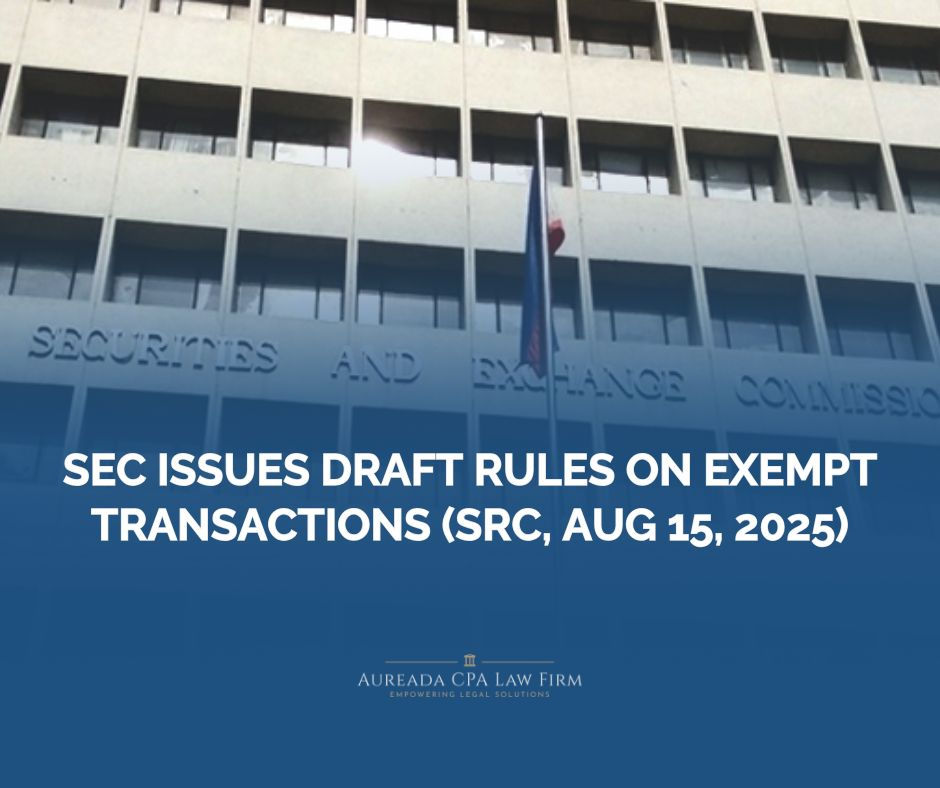SEC Clarifies Rules on Exempt Transactions Under the SRC
- Yasser Aureada

- Aug 19, 2025
- 2 min read

On 15 August 2025, the Securities and Exchange Commission (SEC) released draft guidelines clarifying exempt transactions under the Securities Regulation Code (SRC), Republic Act No. 8799. The move seeks to make compliance more predictable, reduce ambiguity for businesses, and improve ease of doing business in the Philippine capital markets.
Key Points of the Draft Guidelines
1. Section 10.1 – Self-Executing Exemptions
Securities that fall under Section 10.1 (such as certain private placements or intragroup offers) will only require a Notice of Exemption filed through SEC Form 10.1.
No SEC approval or filing fee is required.
The notice must be submitted at least 10 calendar days before the offer or sale.
2. Optional Confirmation for Section 10.1
Companies may still request an official SEC confirmation of exemption for added certainty.
In such cases, Form 10.1 should be filed as an Application for Confirmation of Exempt Transaction, subject to the filing fee of 0.1% of the aggregate value of securities.
3. Section 10.2 – Discretionary Exemptions
Transactions not covered by Section 10.1 must apply for a formal confirmation under Section 10.2.
This always requires SEC approval and the same 0.1% fee under Section 10.3.
4. Section 10.3 – Filing Fee
For exemptions requiring confirmation, applicants must pay a fee equal to one-tenth of one percent (0.1%) of the securities’ maximum aggregate price or issued value.
Why This Matters for Businesses and Investors
Faster Transactions: Routine exempt transactions (e.g., private placements, employee stock options, intragroup transfers) can now proceed without waiting for SEC approval.
Lower Costs: No fees apply if a company relies only on the notice procedure.
Predictability: The guidelines provide clearer rules on when a confirmation is necessary, avoiding conflicting interpretations from past issuances.
Investor Protection: By maintaining a record of notices and confirmations, the SEC ensures oversight without overburdening legitimate transactions.
Our Insights
This clarification strikes a balance:
For businesses, it simplifies compliance and reduces red tape, especially for startups and private corporations raising funds.
For investors, it ensures transparency and protection since all exempt transactions are either notified or confirmed with the SEC.
However, companies must exercise caution. Misclassifying a transaction as exempt under Section 10.1 (without confirmation) when it does not qualify may expose them to compliance risks. Strategic legal advice is crucial in these cases.
At Aureada CPA Law Firm, we specialize in compliance, securities law, and investment advisory. Our team can help you:
Assess whether your planned transaction qualifies as exempt under the SRC,
Prepare and file SEC Form 10.1,
Secure confirmations of exemption when needed, and
Ensure full compliance with Philippine securities regulations.
Contact us today to discuss how these new rules may impact your business and how we can assist you in navigating SEC compliance with confidence.







Comments